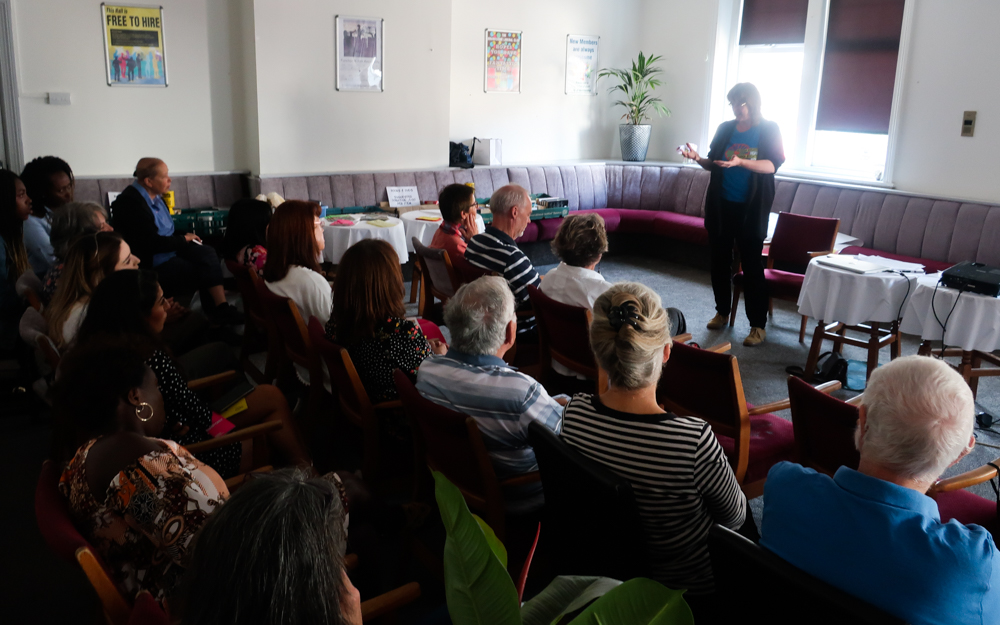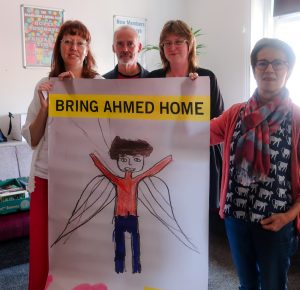|
|
|
|
local news & events Amnesty International group for Bournemouth, Poole & Christchurch
by zarganar
|
|
|
|
by zarganar
We have good news this month from Venezuela, Colombia and Argentina. We report on the creation of a UN fact-finding commission on human rights in Venezuela, continued forced displacements, confinement of communities and death threats to journalists and others in Colombia, Amnesty’s response to the Brazilian President’s speech at the UN, the organisations human rights concerns in Brazil, Ecuador and Argentina and the environmental damage caused by fires in the Amazonia regions of Bolivia and Brazil. You can still sign a petition on behalf of Ecuadorian Amazonian Women.
VENEZUELA
Good news. On 27 September, the UN Human Rights Council adopted a resolution creating a Fact-Finding Mission to investigate the grave human rights violations and crimes under international law that are still taking place in Venezuela. Amnesty welcomed the decision, which it said would send a strong message to victims and perpetrators alike that impunity would not be allowed to prevail. The UK supported the resolution and published an explanation of its vote. The list of those who opposed it makes interesting reading: Cameroon, China, Cuba, Egypt, Eritrea, Philippines and Saudi Arabia.
Prior to the passing of the resolution, the Office of the UN High Commissioner for Human Rights and the Government of Venezuela signed a Memorandum of Understanding, establishing a framework for future discussion and cooperation, and providing for the continued presence in the country of a team of two UN human rights officers.
These developments followed an update by the UN High Commissioner for Human Rights, Michelle Bachelet, during the opening session of the Council, when she raised concerns over the continued deterioration of the human rights crisis and the lack of accountability for even the gravest human rights violations. Amnesty’s Secretary General then wrote to Council Member States calling on them to seize the opportunity to support the victims of the unprecedented human rights crisis in Venezuela and create a Commission of Inquiry that offers truth and justice to its victims. Many thanks to all who signed Amnesty’s petition calling for the Council to act.
EU Member States have imposed sanctions on seven more individuals for their involvement in human rights violations in Venezuela. [Read more…]
by zarganar
 Ulrike Schmidt gave us an excellent talk on human rights infringements in Europe. Ulrike is the Amnesty county coordinator for Bulgaria, Czech Republic, Slovakia, Hungary, Poland and Romania. Ulrike is a teacher and a human rights activist based in London. Originally from Germany, she has worked with Amnesty International for many years on various local and international campaigns.
Ulrike Schmidt gave us an excellent talk on human rights infringements in Europe. Ulrike is the Amnesty county coordinator for Bulgaria, Czech Republic, Slovakia, Hungary, Poland and Romania. Ulrike is a teacher and a human rights activist based in London. Originally from Germany, she has worked with Amnesty International for many years on various local and international campaigns.
Ulrike gave us some chilling examples, mainly from Poland, Hungary and Italy, of how things have changed in recent years. She talked about the harassment of Polish judges who are still standing up for human and civil rights, often in defiance of the government. Also the criminalisation of human rights defenders in Hungary and Italy – and the demonisation and persecution of Roma people in several countries, particularly Italy.
Throughout Ulrike illustrated her talk with short videos, some demonstrating the harassment and violence suffered by those peacefully protesting. She also brought along actions we could complete – these were mainly letters but also a photo action she had created .

Ahmed H has been separated from his wife and daughters for almost 4 years. In September 2015, he was imprisoned in Hungary and convicted for “complicity in an act of terrorism” in a blatant misapplication of Hungary’s counter-terrorism laws. Ahmed H. was conditionally released on 19 January 2019 and is being held in immigration detention in Hungary. As he is a Syrian national he is at risk being forcibly returned to Syria, a country that is not safe. Cyprus must allow his return home to be reunited with his family. More details and to to take action follow this link:-
https://www.amnesty.org.uk/resources/urgent-action-ahmed-h-must-be-allowed-return-home
Another of the actions she featured was prominent prominent human rights defender Elżbieta Podleśna. Following a raid on her home, the police claimed to have found in her home copies of posters depicting the Virgin Mary with a halo around her head and shoulders in the colours of the LGBTI flag. She has been charged with of“offending religious beliefs”, a criminal offence that carries up to two years’ imprisonment. Amnesty believes Elżbieta Podleśna is being targeted for her human rights activism and this absurd investigation must be stopped. More details and to to take action follow this link:-
https://www.amnesty.org.uk/resources/urgent-action-stop-harassment-human-rights-activist
Ulrike says not to worry about the “end by” dates given
by zarganar
This month, we report on continuing extreme violence in Colombia, including murders, against Indigenous people and Human Rights Defenders as the peace agreement shows further signs of unravelling. In Brazil, the wildfires in the Amazon illustrate the risks from the Bolsonaro government’s weakening of environmental protections and Indigenous peoples’ territorial rights, while there is also concern that new public security measures will increase violence against those most at risk. The Human Rights Council will vote this month on a proposal for a Commission of Inquiry on Venezuela, while there is concern that new US sanctions will exacerbate the impact of the economic crisis and lead to increased human rights violations. Argentina is in the midst of a serious economic crisis and President Macri is facing likely defeat at the Presidential elections next month. We briefed officials at the UK’s Department for International Trade who are negotiating trade agreements with countries in the region. There is an Urgent Action and a petition on Colombia and you can still sign the petition on Venezuela.
REGIONAL
On 20 August, David and Graham were invited to the Department for International Trade to brief officials about human rights issues in Latin America. This was an excellent opportunity to ensure that government officials are aware of the human rights issues that need to be considered when negotiating trade agreements with the countries of the region.
COLOMBIA
Iván Márquez, the second highest ranking member of the FARC (Revolutionary Armed Forces of Colombia) guerrilla group, has announced in a video his return to armed opposition to the Colombian state. Márquez, whose whereabouts have been a mystery since July 2018, was the leading negotiator of the Peace Accord with the administration of President Santos. The precarious state in which former FARC guerrillas live is described in this recent article in The Nation.
The UN’s Office of the High Commissioner for Colombia has called on the Colombian authorities to protect the Nasa indigenous people and guarantee their physical and cultural survival. Since the beginning of the year, 36 Nasa people have been killed and 53 have received death threats. Six of those killed were members of the human rights NGO the Cxhab Wala Kiwe Association of Indigenous Councils of north Cauca department.
This coincides with Colombia’s Congress summoning the government of President Iván Duque to explain what it has done to curb extreme levels of violence against the country’s indigenous peoples in south western Cauca.
Native Colombians have seen extreme violence following the demobilization of the FARC guerrilla group in 2017. According to ONIC (the National Organisation of Indigenous Colombians), 37,000 indigenous Colombians have suffered aggression since the signing of the Peace Accord in 2016, half of them since President Duque was inaugurated in August 2018. 31,000 of the aggressions took place against indigenous inhabitants of Chocó.
by zarganar
|
|
|